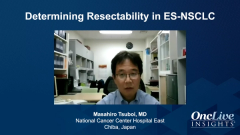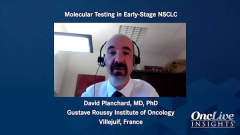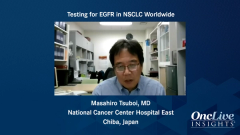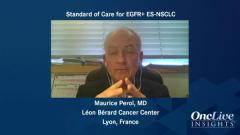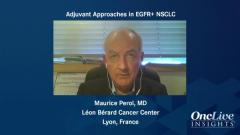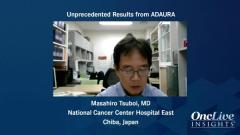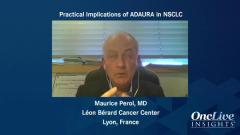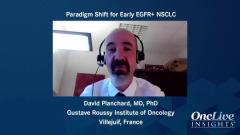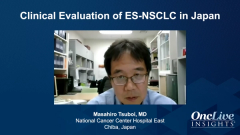
Standard of Care for EGFR+ ES-NSCLC
Episodes in this series

Transcript:
Maurice Perol, MD: What was the standard of care for adjuvant treatment after surgical resection of EGFRmutated non–small cell lung cancer at an early stage? The standard of care was the same as for wild-type EGFR non–small cell lung cancer, given that the EGFR status was generally unknown in such patients after surgical resection. The adjuvant chemotherapy, mainly with cisplatin and vinorelbine, isproposed to fit patients aged less than 70 or 75, depending on whether the patient is fit or not after surgical resection of a stage IIB or greater tumor, or for positive disease.
In my country, cisplatin-vinorelbine is the most commonly used regimen in the adjuvant setting. It is the best validated regimen in this setting, providing a survival benefit of around 9% at 5 years in the subgroup analysis of the LACE meta-analysis, which is very consistent with the results of the ANITA trial. In stage II or III disease, the magnitude of benefit is greater—approximately 15% survival benefit at 5 years for the phase III disease and approximately 12% for the stage II. Even if this regimen remains rather toxic, especially in terms of hematological toxicity, it remains largely used in our clinical practice. We have to also keep in mind that, today, only adjuvant chemotherapy has demonstrated its capacity to cure some patients after surgical resection of non–small cell lung cancer, which is not the case yet for targeted therapies.
For the EGFR mutant patients we do not have yet any - - data on the prognostic impact of EGFR mutations in early stages.Well, in clinical practice an in clinical trial, especially in the control arm of the ADAURA study we can see that many patients with resected early-stage EGFR-mutated non–small cell lung cancer will experience disease relapse even after adjuvant chemotherapy. The long-term survival data from the previous clinical trials, like the RADIANT trial, were more or less immature at the time of publication. In this RADIANT study, for example, with approximately one-third of stage IB, one-third of stage II, and one-third of stage IIIA disease—and given that half of the patients received adjuvant chemotherapy—the median overall survival was around 15 months, with 40% alive at 5 years. This is not very different from the other adjuvant clinical trials with unselected patients, including patients with wild-type EGFR. It is difficult to know if EGFR mutations have an adverse prognostic impact after surgical resection or not. I would say the prognosis is more or less the same as for wild-type EGFR in early stages of the disease.
Masahiro Tsuboi, MD: In Japan, tegafur-uracil, so-called UFT, is used for stage IA and stage IB patients, with or without EGFR mutation. Platinum-based chemotherapy is used in stage II and IIIA patients, with or without EGFR mutations. Tegafur-uracil is only approved in Japan, so no other countries can use such drugs. Japanese guidelines recommend against the use of the EGFR TKI [tyrosine kinase inhibitor]. Right now, the most common therapeutic regimen is doublet chemotherapy, especially cisplatin-vinorelbine, in Japan.
Transcript Edited for Clarity


